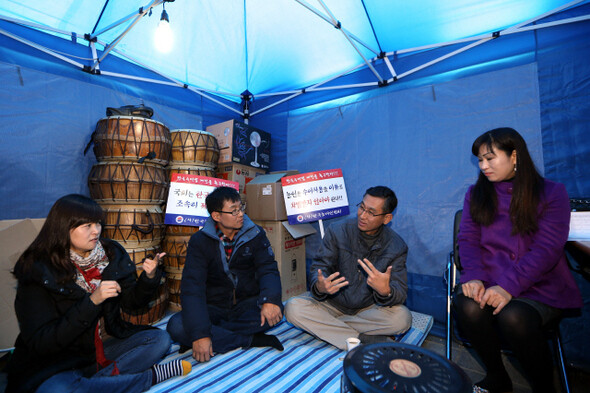hankyoreh
Links to other country sites 다른 나라 사이트 링크
In South Korea, hearing impaired live in a different world

Every day, the ground in front of the National Assembly in Seoul’s Yeouido neighborhood is a site for arguing rights and responsibilities. But in curious silence, the protest site was set up on Nov. 12. Like other sites, it has styrofoam laid out on the ground, with a tent set up overhead. A stove was set up inside the roughly 10m² tent.
There were no shouted slogans or demands, but the “silence” was broken by quietly hung banners. “Deaf people must not be discriminated against for using sign language,” read one. “The National Assembly must legislate a Korean Sign Language Law,” said another.
Every day, pairs of deaf protesters take turns holding down the fort. A sign language interpreter can also be found inside. On the morning of Nov. 24, the tent calling for sign language legislation was being manned by four residents of South Gyeongsang Province with hearing or language disabilities.
One of them, a 44-year-old woman surnamed Kim, had surgery in 2012 for what she described as a “gynecological condition.” The operation took place at 7 am. When it was over, she was asked if she was OK. She wanted to answer, but couldn’t. She also couldn’t understand any of the requests the doctor gave her before the surgery. She needed the services of an sign language interpreter, but the only available interpreting center had operating hours from 9 am to 6 pm.
“I also had trouble when I was hospitalized and the doctor asked if I was in pain when they made their rounds at 8 am,” Kim recalled.
According to Ministry of Health and Welfare statistics, South Korea had a hearing impaired population of roughly 255,000 last year. Another 17,830 people suffered from speech impairments. For most of them, their first language isn’t Korean - it’s Korean sign language (KSL). The legislation they are calling for would give KSL standing on par with spoken Korean. They also prefer the Korean term sueo, or hand language, to the more commonly used suhwa, or hand talking.
A lack of interpretation can sometimes cause unimaginable hardship. Cheon Hyeong-gi, a 46-year-old with hearing and linguistic disabilities, has nearly missed flights because the gate announcement at the airport was made only by intercom. Similar problems arise when riding trains or buses.
“I live in Miryang, which has four sign language interpreting centers - but around 1,500 people with hearing or language disabilities,” he explained. “It’s not nearly enough.”
Around the country, a total of 192 KSL interpreting centers receive government support. There were just 1,134 nationally certified interpreters last year.
Four bills, sponsored by lawmakers from both the ruling and opposition parties, are currently pending in the National Assembly. They would provide for support and training for KSL interpreters, along with a suitable educational environment for people to learn KSL quickly in the early stages of disability.
Jeong Hyun-tae, a 37-year-old fourth year student in social services at Hanyang Cyber University, is a first-language user of KSL.
“Without KSL interpreters, I’ve had to borrow lecture notes from my classmates or listen to lectures with my family to learn the meaning,” he explained. “I’ve always felt isolated, like I’m living in a different world from the non-disabled.”
Yoon Mi-seon, 41, is a graduate of a school for the hearing impaired.
“Even the special schools have almost no teachers on staff who know sign language, so you can’t really learn there. And that leads to problems with getting a job,” she said.
As lunchtime arrived, Kim and the other protesters stepped out of their tent. Instead of chanting slogans, they each held up a sign. “Deaf people have the right to KSL information in all areas of life,” it read. It’s a message you couldn’t hear if you didn’t look.
By Seo Young-ji, staff reporter
Please direct questions or comments to [english@hani.co.kr]

Editorial・opinion
![[Column] Has Korea, too, crossed the Rubicon on China? [Column] Has Korea, too, crossed the Rubicon on China?](https://flexible.img.hani.co.kr/flexible/normal/500/300/imgdb/original/2024/0419/9317135153409185.jpg) [Column] Has Korea, too, crossed the Rubicon on China?
[Column] Has Korea, too, crossed the Rubicon on China?![[Correspondent’s column] In Japan’s alliance with US, echoes of its past alliances with UK [Correspondent’s column] In Japan’s alliance with US, echoes of its past alliances with UK](https://flexible.img.hani.co.kr/flexible/normal/500/300/imgdb/original/2024/0419/2317135166563519.jpg) [Correspondent’s column] In Japan’s alliance with US, echoes of its past alliances with UK
[Correspondent’s column] In Japan’s alliance with US, echoes of its past alliances with UK- [Editorial] Does Yoon think the Korean public is wrong?
- [Editorial] As it bolsters its alliance with US, Japan must be accountable for past
- [Guest essay] Amending the Constitution is Yoon’s key to leaving office in public’s good graces
- [Editorial] 10 years on, lessons of Sewol tragedy must never be forgotten
- [Column] A death blow to Korea’s prosecutor politics
- [Correspondent’s column] The US and the end of Japanese pacifism
- [Guest essay] How Korea turned its trainee doctors into monsters
- [Guest essay] As someone who helped forge Seoul-Moscow ties, their status today troubles me
Most viewed articles
- 1[Column] The clock is ticking for Korea’s first lady
- 2After 2 months of delayed, denied medical care, Koreans worry worst may be yet to come
- 3[Column] Has Korea, too, crossed the Rubicon on China?
- 4Hong Se-hwa, voice for tolerance whose memoir of exile touched a chord, dies at 76
- 5US overtakes China as Korea’s top export market, prompting trade sanction jitters
- 6[Correspondent’s column] In Japan’s alliance with US, echoes of its past alliances with UK
- 7All eyes on Xiaomi after it pulls off EV that Apple couldn’t
- 8[News analysis] After elections, prosecutorial reform will likely make legislative agenda
- 9Samsung barricades office as unionized workers strike for better conditions
- 10More South Koreans, particularly the young, are leaving their religions